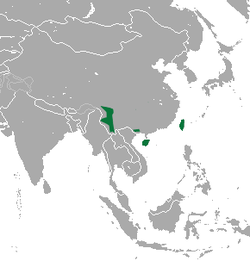| Chinese white-toothed shrew | |
|---|---|
| Scientific classification | |
| Kingdom: | Animalia |
| Phylum: | Chordata |
| Class: | Mammalia |
| Order: | Eulipotyphla |
| Family: | Soricidae |
| Genus: | Crocidura |
| Species: | C. rapax |
| Binomial name | |
| Crocidura rapax Allen, 1923 | |

The Chinese white-toothed shrew (Crocidura rapax) is a species of mammal in the family Soricidae. [1]
